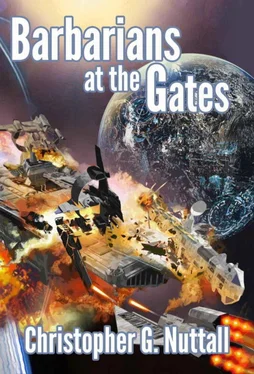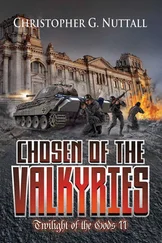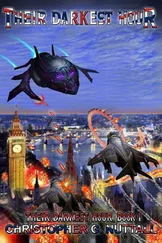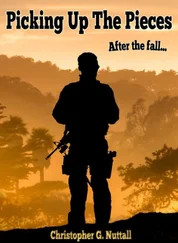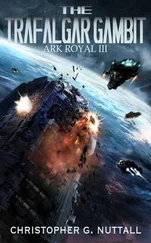Marius studied the display. He’d had to use all of his clout to get the anti-starfighter cruisers into production, fighting against an entrenched design bureaucracy, but it had been worth it. Half of the enemy starfighters had been destroyed before they had a chance to launch their missiles. And he knew that Justinian’s fleet would have to strip away the Grand Fleet’s cruisers first, before Justinian’s men could even try to take out the heavier ships. That should give Marius time to act.
“They don’t have much of a choice,” Marius reminded him dryly. “Send a general signal to all ships; fire at will.”
Magnificent shook violently as she flushed her external racks toward the enemy ships. Every other superdreadnaught in the formation followed her lead, launching their own missiles to strike at the enemy in the wake of the starfighter assault. Hundreds of thousands of missiles flew at the enemy ships, which were grossly outnumbered by Marius Drake’s own forces.
Admiral Justinian’s forces returned fire at once, flushing their own external racks to prevent the missiles from being destroyed or detonated by incoming fire, adding thousands of icons to the display. It was the greatest single number of missiles in action that Marius had seen during his long career, although he’d read that some of the battles during the Inheritance Wars had involved more missiles and superdreadnaughts.
Admiral Justinian’s researchers hadn’t been entirely idle, he realized, as the recon drones he’d launched with the missiles started to report back. They didn’t seem to have the rumored miniaturized FTL communications system that the Senate had believed—or feared—Justinian possessed, but their ECM was greatly improved. A hundred phantom superdreadnaughts and carriers shimmered into view, tricking hundreds of missiles into wasting themselves on nonexistent targets. Their ECM was actually better than the ECM the ships of the Grand Fleet carried. It wasn’t good enough to fool recon drones or shipboard sensors, but it was more than good enough to fool the tiny missile seeker heads.
He allowed himself a cold smile as the missiles entered terminal engagement range and roared down on their targets. With so many missiles, he’d had the luxury of spreading his fire over every enemy superdreadnaught and carrier, capital ships already weakened by the starfighter pass that had left nine superdreadnaughts and a dozen carriers nothing more than burning debris. Justinian would have to defend all of his ships or risk losing them, which weakened his defense still further.
Marius smiled. Vaughn had taught him an old Marine proverb— he who would be strong everywhere is strong nowhere —and it applied, even in space warfare.
“We’ve taken out at least thirty ships,” Raistlin reported. “Nineteen more have been badly damaged…”
The intercom blared a warning. “All hands, brace for impact; I say again, all hands…”
Magnificent shook violently, twice. Red icons flared on the damage control screen, then faded as the computers realized that the ship wasn’t badly damaged.
Marius muttered a curse under his breath as he realized that other ships hadn’t been so lucky. Five superdreadnaughts were gone, while General Sampson had been blown out of formation and was now streaming air as her crew fought desperately to save the ship. It was too late; before her captain could issue the order to abandon ship, her fusion plant blew and she vanished inside a ball of expanding plasma.
A number of the anti-starfighter cruisers had been destroyed as well, he saw. The enemy had either decided to take them out prior to hammering the superdreadnaughts or they’d simply been picked at random by missile brains. No one would ever know for sure.
“Minor damage to sections 4623G and 4878F,” the damage control officer reported to the captain.
Marius overheard the transmission through the datanet and allowed himself a moment of relief. Magnificent could still fly and energize a beam. With the two fleets converging, they would be entering energy range shortly…and then the real slaughter would begin.
“Signal to all ships,” he ordered the ops officer. “I am hereby authorizing rapid fire. I say again, rapid fire.”
“Aye, sir,” Raistlin said.
A dull thunder could be heard, even within the flag bridge, as the superdreadnaught switched to rapid fire, launching missiles in sprint mode. Justinian’s men would find it much harder to intercept them before they reached their targets, although the targeting wouldn’t be so accurate.
“Sir, Admiral Mason is asking for orders,” Raistlin informed him.
“Tell him to concentrate on the enemy carriers,” Marius said with a nod. “The superdreadnaughts are to continue firing on the enemy superdreadnaughts.”
Most of Admiral Justinian’s carriers had been taken out, leaving Justinian with only a handful of ships that were able to rearm their starfighters. Once the rest of them were taken out, the enemy starfighters would be deprived of a base. They’d be fucked, completely. And then they’d have no choice, but to surrender—or die.
He kept his face impassive as two of his superdreadnaughts exploded in quick succession. And then Admiral Rodney died when a missile pulsed through her shields, speared through one of her fusion plants and detonated the antimatter warheads in her magazines. Admiral Yamamoto staggered out of formation, seemingly unhurt, but something had blown inside her hull; she vaporized. He barely noticed the death of the battlecruiser Triumph or the heavy cruiser Kimball Kingston . When superdreadnaughts were dying, each one taking over three thousand trained spacers and officers with her, the lighter ships seemed like small change.
“Arunika,” he said, keying his wristcom, “have you located the enemy flagship?”
“Negative,” Arunika said. “The enemy have their datanet locked tight.”
Marius doubted that it would be easy to locate Justinian’s flagship, so they’d just have to hope they destroyed her soon. The only proof he had that the enemy flagship was still intact was that their formation hadn’t shown any signs of panic or disintegration. Even under the best of circumstances, transfer of command wasn’t easy—and the middle of a battle was hardly the best of circumstances. The chaos that had followed Admiral Parkinson’s death bore mute witness to that.
“Understood,” Marius said, breaking the connection. He looked over at Raistlin, who was obviously waiting for orders. “Tell all ships to continue firing.”
* * *
Rampant Lion screamed as another missile slammed against her shields and raw energy burned through to her hull. The admiral’s flagship had led a charmed life, almost, until now. With the escorting carriers gone and most of the smaller ships destroyed in the crossfire, the remaining superdreadnaughts were almost alone.
Caitlin looked over at Admiral Justinian. She wondered if he realized that the battle was lost. Charging into the teeth of the enemy formation, energy weapons blazing, would inflict vast damage, but it would also lead to the complete destruction of his fleet.
“Pull us back from the enemy fleet,” Admiral Justinian ordered finally. His voice held the bitter tinge of defeat. “Order the remaining starfighters to cover our retreat.”
Caitlin knew that the admiral now realized that his fleet had been savaged and that he wouldn’t have much chance to extract even the surviving units from the disaster, and that was good. But the math didn’t add up. They would have to alter course and head to the mass limit, as they’d never make it back to the Asimov Point, and flee to Harmony with a much larger fleet snapping at their heels. This did not seem like sound strategy, especially as it reminded her of the Battle of Jefferson…except back then, they’d forced the Federation lickspittles to flee. Now the boot was on the other foot and she didn’t like it.
Читать дальше
